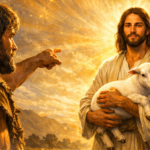“New Testament Giants of the Faith – Peter” – Acts 11:1-18
Introduction: New Testament Giants of the Faith
For the past 3 weeks we have been looking at New Testament Giants of the Faith. We have considered Thomas – perhaps more appropriately a Giant of Doubt, but one whose honesty and humility, whose commitment and confession speak of real discipleship that we can relate to. Two weeks ago, we looked at Paul, whose astonishing conversion not many of us can relate to, but whose missionary journeys inspire us, and whose writings point us to so many key teachings and encouraging statements, including that “one of first importance” – that Christ died for our sins and that He rose again from the dead… according to the Scriptures. Last Sunday, we heard about the disciple John – that disciple whom Jesus loved – the one who told those long personal interest stories that we may find ourselves fitting into, the one who revealed those 7 “I AM” sayings of Jesus, the one who unpacked in marvelous ways the unimaginable love of God for us.
1. Peter – who was he?
Today, we land on Peter, also called Simon, undoubtedly the most famous disciple of Jesus. His name is always mentioned first in any listing of the disciples, and it’s mentioned more than any other in the Gospel accounts simply for the various interactions he had with Jesus, and then in the Book of Acts for his leadership in the early post-ascension church. But let’s find out who he was.
It was a big deal in the Bible whose family you were part of. That pattern was established early on in the Book of Genesis, with several tracings of family heritage from father to son. There are two genealogies of Jesus in the New Testament – one to show that He was descended from Abraham, the other to show that He was truly the Son of God, Himself. Last week, we heard the names of both the father and mother of disciple John. So, it’s no real surprise that the Bible tells us who Peter’s father was. We heard it two weeks ago in the John 21 episode in which Jesus asks Peter three times “Simon, son of John, do you love me?” So, Peter’s dad’s name was John, and we hear that fact confirmed in John 1 and also in Matthew 16, where his dad was identified as Jonah. We don’t know Peter’s mother’s name, but we do know that he was married because he had a mother-in-law whom Jesus healed from a fever.
We also know that Peter had a brother named Andrew. In John’s Gospel, Andrew was actually the first one to come to Jesus, but then he brought Peter, too. Matthew’s Gospel tells us that the two brothers were fishermen near Capernaum, or maybe Bethsaida, on the north side of the Sea of Galilee, and that John and James were their fishing buddies. It was there that the four of them were called to discipleship by Jesus. Acts 4 reveals one more thing about Peter – he was an idiot! Don’t laugh, that’s the Greek word that the Jewish religious leaders used to describe Peter in Acts 4, after he and John had healed a crippled man. By it, they meant that he was uneducated, a simple man, just a fisherman, someone they wouldn’t expect to have the courage to stand up against them.
Now we might consider Peter an idiot for different reasons. He was the disciple who barged right into Jesus’ tomb on Easter Sunday morning… forget about the contemporary traditions and taboos about tombs and the dead. He was the disciple who, when Jesus was being arrested by Roman soldiers, took out a small sword and cut off a man’s ear. “Peter… what were you thinking?!? You are already surrounded by soldiers!! You think you can out fight those trained military men with one paltry weapon?” He was the disciple who, when seeing Moses and Elijah with Jesus on the Mount of Transfiguration, offered to build three shelters there so that they could stay a while. He was the disciple who, hearing an apparent ghost self-identify as Jesus out on a storm-swept Sea of Galilee, said, “Lord, if it’s you, tell me to come to you on the water.” And then he stepped out of the boat.
Idiot?? That’s not a bad word to describe this impulsive, “take your foot out of your mouth just to put the other one in,” “blurt the first thing that comes to your mind,” disciple. Maybe we could use softer words like ‘emotional,’ ‘unthinking,’ ‘spontaneous,’ or ‘unrestrained.’ People do seem to be either spontaneous or planners. I love the “Hi and Lois” comic from 30 years ago. Lois commented to her husband, “We never do anything spontaneous anymore.” Thinking about it, Hi replied, “You’re right… why don’t we schedule that for Thursday evenings.” I am a planner, a scheduler, I pay attention to my calendar and my appointments. Peter was that “step out of the boat” spontaneous kind of disciple. There is room for both in God’s Kingdom. Whatever word we use, Peter was certainly one of a kind. In fact, so much so that early Christian tradition tells us that Peter was crucified, but when he protested that he didn’t deserve to die like Jesus did, they crucified him upside down instead.
2. Peter stories
Let’s take a look at some significant stories about Peter in the Bible, and what they say about our following of Jesus.
a. The catch of fish / fisher of men!
There are actually three different stories that seem to relate Peter’s call to follow Jesus. I think the one recorded in Luke 5 is the most striking. Jesus was at the Sea of Galilee, teaching a crowd of people the Word of God. He was acting as a rabbi, just not in the regular venue of a synagogue. He got into Peter’s boat and drifted out a bit from the shore, continuing His teaching from a floating pulpit. Then He invited Peter to go out into the deeper water for a catch of fish. Although they had fished all night without catching anything, Peter consented. This time, he and his fishing buddies both caught nets so full of fish that their boats began to sink. Peter was stunned, and, in that moment, recognized something about Jesus, this man in his boat. He also recognized something about himself… he said, “I am a sinful man!” As he compared himself to Jesus, he acknowledged his spiritual poverty, and confessed his sin. As we figuratively stand in the presence of Jesus here today, it’s good for us to hide our faces and to confess that we don’t deserve to be in the same boat as Jesus. We have done that in our confession of sins, in preparation for taking part in the Holy Supper of our Lord.
One more thing about this story – Jesus said that from now on Peter would not be catching fish for the kitchen table, but he would be catching people for the Kingdom of God. It was kind of like a foreshadowing of Jesus’ Great Commission at the end of His ministry – “Go and make disciples of all people…” That Great Commission – from the beginning of Jesus’ ministry or from the end – applies to us. Jesus wants us, with our words and our deeds to be catching people for His Kingdom, to be calling people to life-long discipleship, which stretches into eternity-long living!
b. The confession
A second Peter story is quite memorable. In Matthew 16, Jesus takes the disciples north of Israel proper to a region called Caesarea Philippi. The Jordan River actually begins there with three springs bubbling out of the ground, out of the caves. Because water is the source of life, it was believed that a god lived there, in the caves, and this had become a religious center for the worship of Pan, a Greek god. There were idols to Pan set in the rocks of the mountainside, and that area was actually known as the Gates of Hades, the underground winter home of those gods. What an odd place for Jesus to bring his disciples. What an odd place for Him to ask them for their assessment of the spiritual pulse of the people. “Who do the people say that I am?” The disciples reported various responses, but then Jesus made the question personal, “Who do YOU say that I am?” Peter piped up with unexpected insight into the identity of Jesus: “You are the Christ, the Son of the living God!” In other words, “You are not like these lifeless stone idols in the mountainside. You are the Son of the LIVING God!”
Jesus’ response affirmed Peter’s confession of faith. “You’re right. God revealed this to you. I will build my church on what you have professed. On top of these rock idols, my church will stand and take precedence. The Gates of Hades will not stand up against what you have said, what you believe.”
As part of the church today, we want to make the same confession as Peter made – “Jesus, You are the Christ, the promised Saviour that God sent. You are God’s true and living Son.” As we do that corporately, Jesus is building us into the church which death and Satan cannot stand up against. We have the power of the living God.
c. The denial (and reinstatement)
Every time, as we have considered the New Testament Giants of the Faith, we have noted their shortcomings and failures… their sins. That helps us to realize that they weren’t so holy and perfect. In their failures, we can see ourselves. Peter is no different. He may have been a loud and proud disciple, one who was quick to boast of who he believed Jesus to be. But within a year or two, his tune changed. After the arrest of Jesus, Peter had followed the small crowd into the courtyard of the high priest. There on three separate occasions, Peter said that he wasn’t with Jesus… in fact, that he didn’t even know Him. This was Peter’s greatest failure… his denial of his Lord.
If we are honest with ourselves, we must admit that, like Peter, there are times in our lives when we deny knowing Jesus or being connected with Him. It might be very personal, like neglecting to read our Bibles and pray, or avoiding attending weekly worship. It might be more public, like conversations that turn to things religious, and we fail to stand up for Jesus when He and His teachings are under attack. When we are silent about Jesus, we are, in essence, accessories in denying Him. When Peter remembered that Jesus’ had predicted those three denials, he went outside and wept bitterly in remorse for his disassociation with Jesus. When we realize that we have, in some way denied Jesus, it is equally important that we acknowledge that and come to God in repentance, for forgiveness.
The follow-up to the story of Peter’s denial was the Epistle reading from two weeks ago. There Jesus asked Peter three times – once for each of his denials – if Peter loved Him. When Peter replied in the affirmative, Jesus urged him to feed His lambs and sheep. It was, Bible scholars believe, Jesus’ way of reinstating Peter to full discipleship.
d. Pentecost
Another powerful Peter story takes place in Acts 2 on the Day of Pentecost. Pentecost was a Jewish Festival of Harvest, but on this particular Pentecost – the one after Jesus’ Ascension – the Holy Spirit was sent to equip the disciples with the power to proclaim the crucified and risen Saviour. Peter was the one that interpreted to the Jerusalem Pentecost crowd the significance of what they had seen and heard. It was the fulfillment of God’s Old Testament promise to send the Holy Spirit on young and old alike, on men and women alike. Peter’s message pointed to the fact that the Jewish people of Jerusalem had put Jesus to death, but that God had raised Him from the dead. His final statement was similar to his prior confession: “God made this Jesus… both Lord and Christ.” The message hit home in the hearts of the gathered people, and they asked what they should do. Peter urged them to be baptized and forgiven in the name of Jesus. Many did, and 3,000 people were added to the number of believers that day. Peter continued to be a dominant public force in the early church in the first few chapters and the first few stories in the Book of Acts.
e. The vision (Acts 10, and 11)
And that brings us to the story we heard in our first reading from Acts 11. Really this is simply a retelling of the original story which happened in Acts 10. The story happened with two people in two locations – the Roman centurion Cornelius in Caesarea, and the disciple Peter in Joppa. Each one had a vision. Cornelius’ vision was simple – an angel told him to send men to Joppa and bring back a man named Peter. Peter’s vision was more complex. He saw a sheet full of animals let down from heaven. It was lunch time and Peter was hungry, and a voice invited him to kill one of the animals and eat. But the trouble was… all those animals were unclean animals, and Peter, being a good, obedient Jew, refused the invitation – “I don’t eat unclean food.” The voice spoke again: “Do not call anything unclean that God has made clean.” The vision and the voice were repeated three times and then the sheet was lifted back to heaven.
At that time, the men from Cornelius arrived, and invited Peter back to Caesarea. Peter went, hesitantly, realizing that it was against Jewish laws to go to the home of an unclean Gentile. But the vision had taught him that if God was giving the green light to eat formerly unclean foods, God could also be giving the green light to talk to formerly unclean people. He went. He told them about Jesus crucified and risen from the dead. They believed and were baptized. When Peter told the entire account to the believers in Jerusalem, they had no choice but to conclude: “God has granted even the Gentiles repentance unto life.” What this lived-out-parable story teaches us is that we dare not demonstrate favouritism or prejudice when God accepts all who turn to Him in faith.
3. Peter writings
Peter was not as prolific a writer as either St. Paul or fellow disciple John. Peter only wrote two short letters – one of 5 chapters, one of 3 chapters. Oh, and our “Front to Back” Bible reading group has just nicely gotten into 1 Peter this week, so they know there is LOTS of good stuff in there, things I think that many of you will recognize, too. So, let me just share with you some of those memorable verses… and you can see them on the screen…
1 Peter 1 – “In His great mercy, God has given us new birth into a living hope through the resurrection of Jesus Christ from the dead… [Peter couldn’t help but speak of Jesus’ resurrection!] and even though you do not see Him now, you believe in Him… and are receiving the goal of your faith, the salvation of your souls.”
1 Peter 1 – “You know that you weren’t redeemed with perishable things such as silver or gold, but with the precious blood of Christ, a lamb without blemish or defect.”
1 Peter 2 – “You, like living stones, are being built into a spiritual house with Jesus as the chosen and precious cornerstone… You are a chosen people, a royal priesthood, a holy nation… to declare the praises of Him who called you out of darkness into His wonderful light.”
1 Peter 3 – “In your hearts set apart Christ as Lord. Always be prepared to give an answer to everyone to demonstrate the hope you have.”
1 Peter 3 – “Like water and the Ark, the water of Baptism now saves YOU… by the resurrection of Jesus Christ.”
1 Peter 4 – “Love covers over a multitude of sins.”
1 Peter 5 – “God opposes the proud but gives grace to the humble… Cast all your anxiety on Him because He cares for you.”
2 Peter 1 – “We were eye-witnesses of His majesty… We ourselves heard this voice that came from heaven when we were with Him on the sacred mountain [of transfiguration].”
2 Peter 1 – “Prophecy never had its origin in the will of man, but men spoke from God as they were carried along by the Holy Spirit.” And a couple of chapters later Peter specifically names Paul as one who wrote with the wisdom and inspiration of that Holy Spirit.
2 Peter 3 – “With the Lord a day is like a thousand years, and a thousand years are like a day… The day of the Lord will come like a thief… We are looking forward to a new heaven and a new earth, the home of righteousness.”
There is lots there – in Peter’s life experiences and in Peter’s writings – for us to grab on to with our hearts and minds! We are invited to confess with Peter that Jesus is the Christ, the Son of God, our Saviour… the one who has redeemed us by His holy and precious blood. When we fail in our spiritual lives, when we – by word or deed – deny Jesus, we can cast all our cares, all our sins on Him, and be confident of His forgiveness and grace. Peter was an eye-witness of Jesus’ majesty – both on the mount of Transfiguration and in the empty tomb – and we can see that glorious Jesus through the eyes and the testimony of Peter. We are called to be fishing for people for the Kingdom of God, declaring His praises, always ready to give the reason for the hope we have – the goal of our faith, the salvation of our souls.
We end today with Peter’s concluding words from his second letter: “Grow in the grace and the knowledge of our Lord and Saviour Jesus Christ. To Him be glory both now and forever. Amen.”






